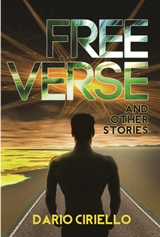The first in a series of essays in which I air aspects of my own strongly-held, evolving, and sometimes contrarian worldview. Indulge me–this is about so much more than TV.
Fit the First
I hate television. Fortunately, my wife isn’t too fond of it, either. My dislike of the medium is so strong that I find it difficult to be in someone’s house with the damned thing on. It’s a social catastrophe, at once degrading conversation, distracting people, and filling everyone’s head with a stream of endless chatter, as if the chatter of our own minds weren’t already enough to contend with. The invasion of every public space—gyms, waiting areas, bars—by the plasma screen upsets and offends me. Are we insane, that we allowed this to happen?
Why do I dislike the medium so much? Let me count the ways.
First is the near-catatonic passivity of both body and mind that television induces in the viewer. Whereas reading or listening to radio or audiobook engages the imagination in active creation, TV puts those faculties to sleep and, I believe, dulls them by negative reinforcement. Worse still, since we humans are primarily wired for visual input, so that around 70% or more* of our sensory information comes through that channel, the images we see on television, especially those of high emotional content, such as soap operas, angry mobs, murder, mayhem, and political rhetoric, tend to slip past our conscious filters and embed themselves deep in our psyche. It promotes fear and perpetuates stereotypes. Television is the perfect mind-control tool.
Other gripes, such as the low quality of most offerings and my monumental disdain for advertising, pale by comparison. Nor do I for a moment buy the defense that educational content such as the History Channel’s offerings or Sesame Street in any way redeem the medium: the former is padded and extended with useless filler and silly, unnecessary dramatization (read a book instead, dammit!), and the latter simply teaches innocent young minds that the idiot box is their friend and surrogate mummy.
So the fact that we’ve allowed the internet to be turned into something largely indistinguishable from television is—to my mind—a profound tragedy and an affirmation of our collective disinterest in any kind of societal growth. We are clearly not serious about building a better world or improving our minds and knowledge. We’d rather just watch YouTube.
Fit the Second
Although we have neither a cable nor a satellite connection in the home and we don’t stream, we do we have a TV, which we use to watch movies on DVD and VHS media. In recent weeks, we’ve been enjoying a run of classic and cult movies from the 1960s and early 1970s (many of these are part of the excellent Criterion Collection). I want to talk about three of these: Blow Up, Solaris (the Tarkovsky original) and If.
Apart from the power and heft of the films themselves, one thing that struck me in each of these was the pace at which people’s lives (I’ll come back to this shortly) flowed just two generations ago, and, not coincidentally, the depth in which our inner lives are examined in these three films.
Even though the lead character (played by David Hemmings) in Michelangelo Antonioni’s Blow Up lives life in what then would have passed for the fast lane, he doesn’t lack for down time. In the film, set in the swinging London of the mid-60s, Hemmings plays a young photographer who realizes that a series of pictures he took on a whim in a London park document a mysterious murder. When he tries to cut through the distractions and banality of the everyday and arrive at the truth, he finds himself thwarted at every turn until, in the end, the antics of the traveling mime troupe with which the film opens becomes a metaphor for our lives.
The 1971 film Solaris (at the time dubbed ‘the Russian 2001’) will, to some modern viewers, appear glacially slow. It’s not: although the action appears to unfold slowly, the film is so rich in psychological content and imagery as to almost overload the psyche and push it into overdrive. With its meditation on human relationships (do we love the person or our concept of that person?), our aggressive instincts, the relationship between reality and consciousness, and the vast barriers to communication with alien species, this film made me feel I’d come home, rediscovered what it is to look inside and dwell there, rather than feeling overwhelmed by the endless bombardment of external trivia.
The last of this trio, Lindsay Anderson’s If, stars Malcolm McDowell as an anarchic adolescent antihero who takes on the British establishment. Although the film mostly concerns itself with the regimented brutality of the 1960s British social order and its suppression of and reaction to non-conformity, the strong surrealist currents in this movie (as in the former), the transitions between colour and black and white, and the power of the film’s apocalyptic final scene (unthinkable in today’s fear-saturated sociopolitical climate), and above all, the absence of high-speed action and external momentum culminate in a psychic impact that—like the previous two films—makes modern attempts to do the same laughable.
Fit the Third
We live in a world and at a pace where the inner life and dialogue, as well as the flexing of the creative imagination at a level beyond the superficial, is both difficult and discouraged. Television—along with the internet, the smartphone, and all the rest—has replaced religion as the opium of the masses. As long as we have these things we trundle along, perhaps not happily but at least tolerant of all social and economic ills. It’s not inconceivable that we’re rewiring our neurons and building new cortical pathways in our brains to such an extent that we’ve begun to evolve into a new species of human.
I can envision a near future in which millions would accept, and even welcome, indentured servitude as a means of keeping food on the table and a roof over their heads; but if all TV broadcasts, networked media, and game systems were to break down tomorrow, I think our social fabric would disintegrate. I don’t believe that a generation of adults raised in daycare and suckled at the terrible altar of the glass teat could cope with being suddenly thrust into a situation where they have time and are forced to explore their inner space, to reflect and think, and to communicate with others on a level beyond the banal.
An elitist view? Judgmental? Perhaps. But don’t get me wrong: I’m no luddite. My argument is not with technology but with the way we choose to use it. Hardwired as most of us are for short-term benefit (the technical term is ‘hyperbolic discounting’), we seem to have a tremendous gift for turning powerful technologies into either weapons, tools of mass control, or time-wasting frivolities.
If you find it difficult or are too young to remember a time before modern communications technology had become a central part of our lives; a world of just a handful of TV channels with limited broadcasting hours; without email, smartphones, or even answering machines; a world with half the population of today, and in which a person with even a half-decent job could enjoy a good middle-class life; a world in which ADD referred to an arithmetical operation; a world in which we actually spent time with ourselves and our thoughts; try the following.
Take a weekend alone somewhere without your phone or laptop or any device, and where there is no television—don’t cheat. Try to go into nature instead of a B&B, or at least spend as much time as you can out of doors and away from people; if you can go somewhere remote, all the better. Don’t even wear a watch. I’m talking about being somewhere you can watch the clouds go by, or a stream flow, or ants go about their business, for an hour or more without interruption or the ability to measure time.
At first, you’ll probably be bored, maybe restless. You may experience anxieties. The time will stretch weirdly: an hour will feel like four or five. Note these impressions without feeding or buying into them.
Before long you’ll find yourself easing into an internal state, reconnecting with your inner life in a way that you haven’t in a long time. For those of us who are writers or artists, that’s the wellspring, the place it all comes from; it’s hard to create without having at least some contact, however imperfect, with that place. For those of us who don’t regularly go there, perhaps haven’t since childhood, this reconnecting can—and will—be an amazing, maybe transformative experience.
So humour me, will you? Try it out, then come back and let me know what it was like. It’s eminently possible, whatever your current lifestyle, to claw back your time and reconnect with your inner life. It might take determination and will, but it can be done.
And the first step is to ditch your TV.
* Some researchers suggest the number may be as high as 80%









